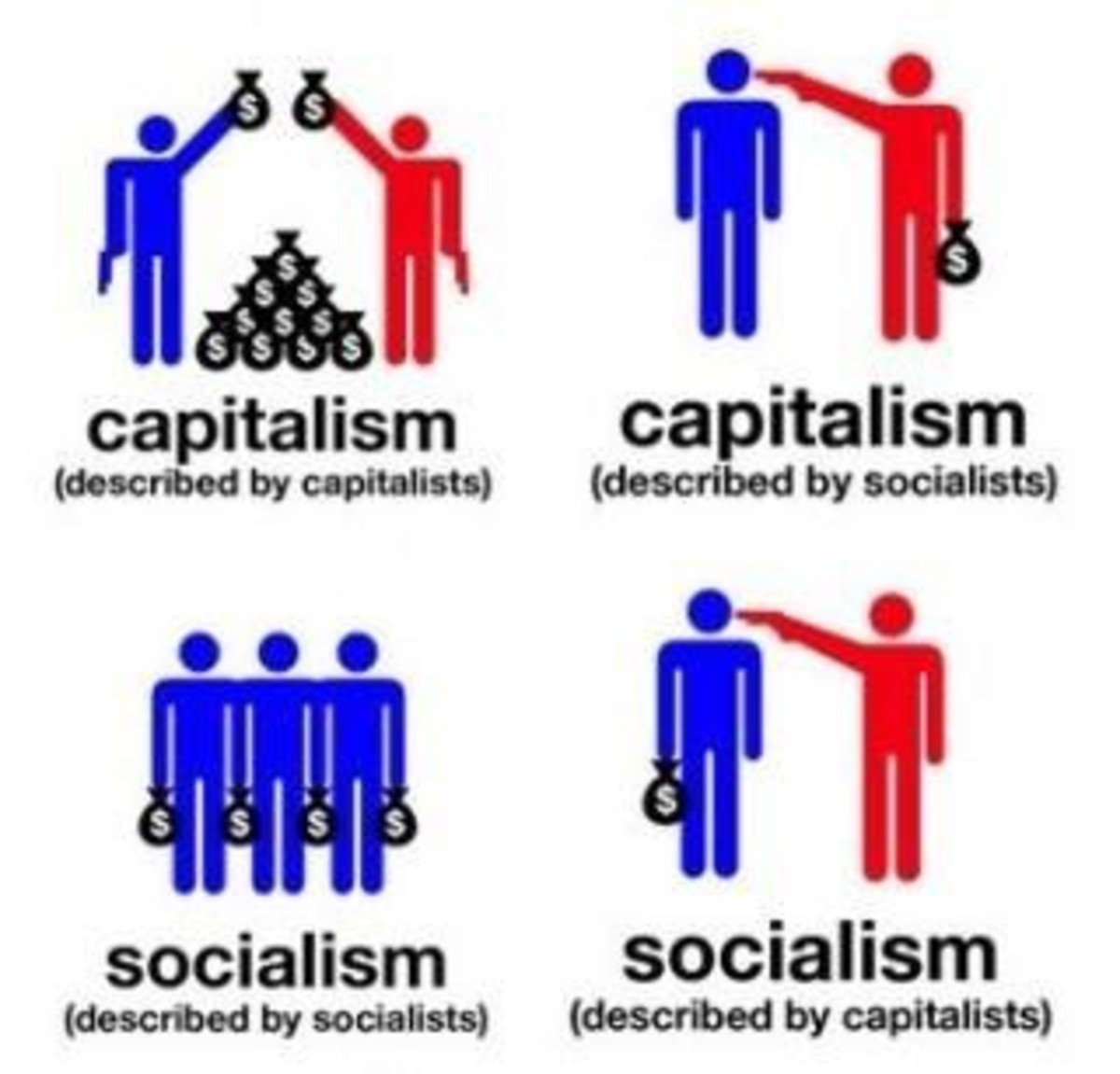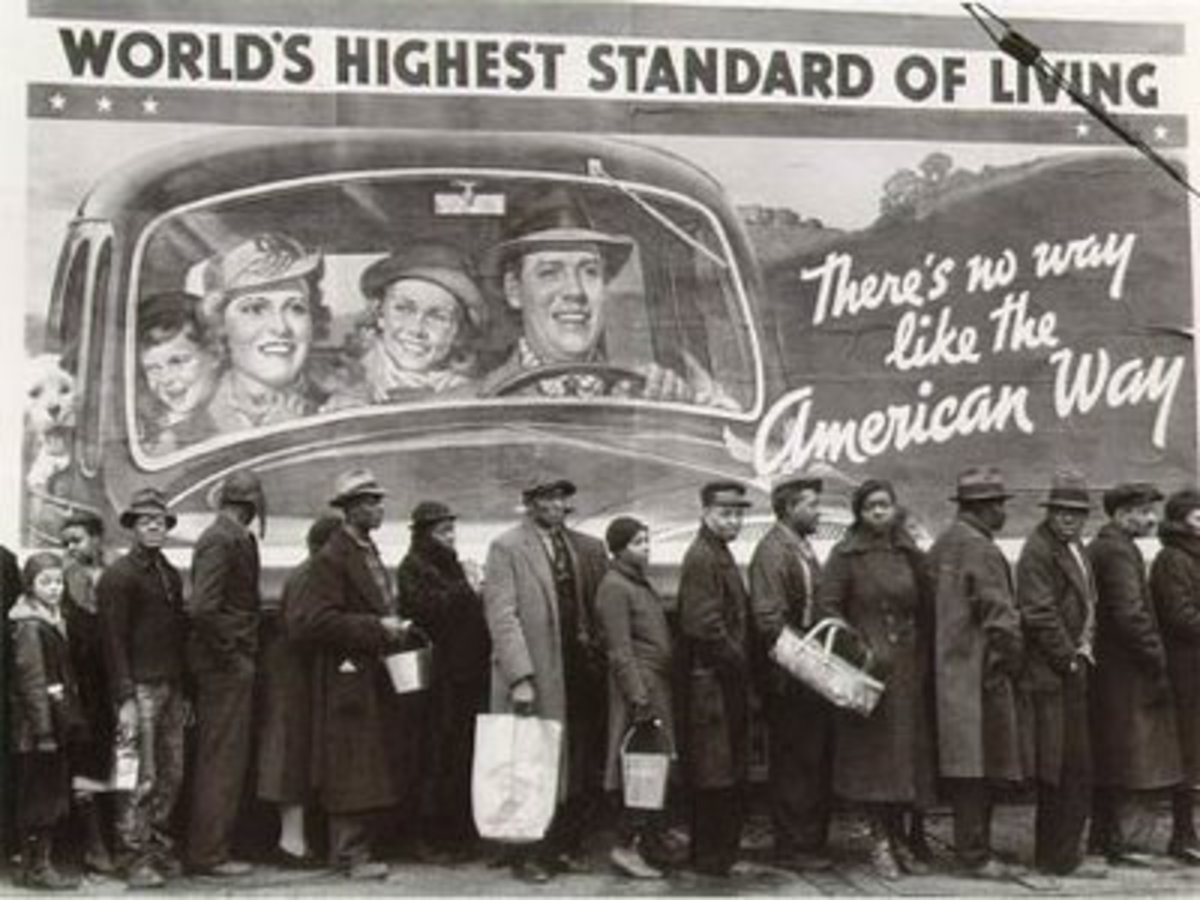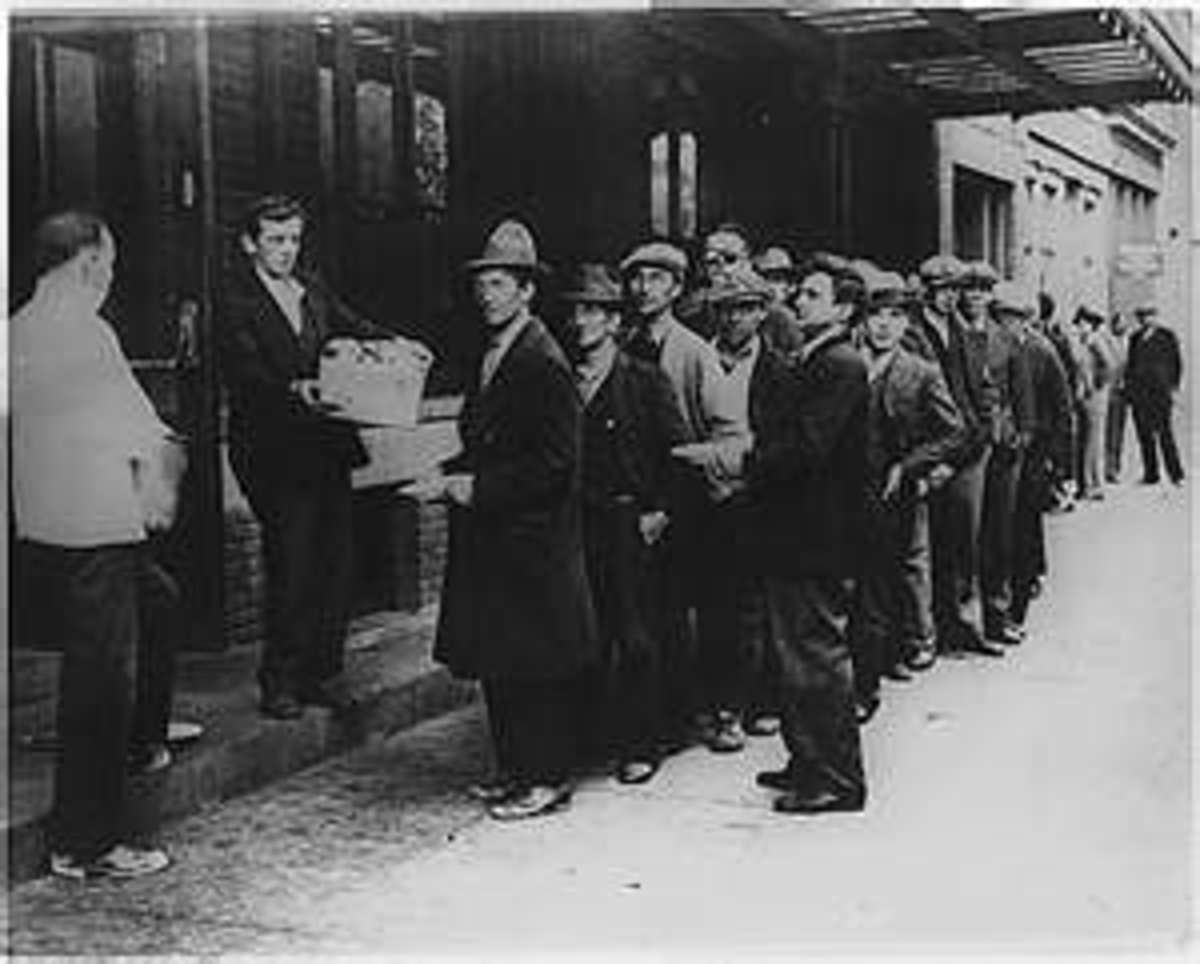The Positives of Capitalism
Basics of Capitalism
In a capitalistic society, the economy is controlled by a free market strategy. This means simply, that prices are controlled by supply and demand, and that profit is made as the market will allow. Businesses compete with each other and the consumer is offered the largest variety of goods and services at the lowest prices.
Now in the last several years and since the election of Barak Obama, capitalism has been questioned by a lot of folks both inside and outside the new administration. Furthermore, the US, as the largest free market in the world has endured a huge amount of criticism both from her own citizens and those of other nations. Now admittedly, there once were a lot of issues with our nation's finances, but the last few years have been some of the best ever.
Beginnings of Capitalism
Capitalism and free markets have been around as long as mankind. It's no secret, that before civilization, people lived in tribal communities. Vestiges of this can still be seen in the aboriginal peoples of Australia or South America. When the entire world's population lived like this, there was no currency, or official monetary system. People generally lived in their own local area and usually didn't travel much unless a lack of food or something else required it.
Now there were a few nomadic groups who periodically roamed from one region to another, and these probably started up the trade business. Tribes who lived in game rich areas had an abundance of meat and skins, while others were good sources for grain, or fish. The nomads were able to establish trade, and make more things (like goods and services) available to the groups that stuck around home most of the time.
Then at some point, probably early on, someone figured out that gold was something everybody wanted. It wasn't good to eat, and you couldn't make a campfire out of it, but the people who didn't have it were willing to trade food or clothing in order to get it. And that was the beginning of capitalism.
Your Capitalistic Nature
Ok, so fast forward a few thousand years, and you get to the present. Capitalism is as simple as your own checkbook or budget. If you think about it, isn't it true you spend your money where you feel you get the best value? Maybe not the lowest price, but at least the best overall value?
That's where capitalism reigns supreme. You don't have to do a lot of comparative shopping to discover that some businesses sell what you want for less, sometimes a whole lot less that other businesses do. That's how the free market works. Whoever is able to provide the desired products at the best value is going to have the best shot at success. And that translates into a better selection at a lower price for us, the consumers.
Modern Day Capitalism
All of this brings us to today, and capitalism has evolved into an incredibly complicated subject. The last several years have exposed some of the worst things that can happen in a free market, starting with Enron and all of the government bailouts that are threw so much money down the well. And it is all this that has so many people worldwide calling for some kind of controls to prevent financial crises. But is all this really the fault of capitalism?
An old adage credited to Ben Franklin says "time is money." Well, you decide for yourself, at least the majority of the time, how you will spend your time. You may choose to find a job and spend forty or so hours working for someone and getting paid for your time. In the simplest sense, you are trading your hours for financial gain. Another option is to combine your time and creativity, to produce something of value that when offered to someone else, will bring that gain. In this case, you are being rewarded for your efforts as opposed to your time. Some people realize a greater return and more satisfaction doing this and others don't. Either way both are examples of capitalism.
The next step in capitalism is for the individual to increase his earnings and value. This is as simple as a bank savings account, or as complex as Wall Street investments. Increasing one's skills and abilities or experience is another as it potentially increases earning power.. All of these are indicative of an entrepreneurial spirit.
An entrepreneur, by definition, is someone who organizes, manages, or assumes the risks of a business or enterprise. Maybe, the entrepreneur is simply working to support him or herself, or possibly a family as well. Or he or she might have a desire to grow their enterprise and hire others to work for them becoming an employer. At that point, they not only are providing for themselves but also providing the means for others to earn their way. So now capitalism is growing.
At some point, the entrepreneur has options to explore. Before establishing a business of any size, the person is probably going to be considering the investment of significant time or money in order to make things work. So in the minds of most people, they are going to balance the estimated return on their investment against other possible scenarios. For example, let's assume Joe and Velda have twenty-five thousand dollars of liquid assets and a dream to operate a delicatessen. They calculate they will need to borrow additional funds to set the business up in a manner that will maximize their chances for success. They project that their annual return on the investment, after all operating and living expenses will be about three percent. So the next question they ask themselves is, will they make more and derive more satisfaction by opening the deli, or would it be better to put the money into some sore of stock investment that guarantees a similar return? Their decision not only will affect them, but at some point could affect others who might become employees or suppliers of the business.
And this illustrates another dimension of capitalism. As an established business, the deli provides a number of wealth creation opportunities. First, a business has to have somewhere to be, so a suitable location is found, and either a sale is generated, or monthly revenue is created by the payment of rent. Next. the local utilities, power, water and phone each receive an amount on a regular basis. Most likely, one or more forms of advertising media are allowed to be compensated for their services as well, and the new owners haven't even placed their first order for meat, cheese, or buns. You can probably see where this is going; that in the return on the owner's investment, others of a similarly entrepreneurial spirit realize a return as well.
Now, multiply the story of the deli times every successful business that operates in our country today, and you can see it's all intertwined and the success of everyone depends on the success of everyone else. And not only do businesses thrive, but people have an almost limitless array of sandwiches, TV's, cars, electronics, etc. etc. to choose from.
It's normal for businesses, and enterprises to grow and expand as the need for products or services increase. However, as businesses seek to maximize their profitability, competition comes into play. Suppose Joe and Velda run their shop for several months and then one day, a salesman walks in and offers them a large discount on food, and other things they need. They accept his offer and soon they are churning out sandwiches and saving ten percent over the way things ran earlier. The bottom line improves, and they have more money in their pocket. Now, they have more options to look at. (1) Do they disount their sale prices to maintain the original margin and hope to get new customers? (2) Do they use the extra money to open another location and multiply their sales and profits? (3) Do they keep the extra money and buy a new home/car/boat?
If they choose either of the first two options, they will increase competition against other businesses of a similar nature. Assuming the market for deli sandwiches is a finite entity, then increasing their market share will result in a reduction of market share from other business operations. But at the same time, all companies want to grow and increase sales so someone will have to come in second. Ideally in a free market system, consumers will decide who survives and who doesn't The total market share doesn't always grow at the same rate as the share of individual marketers so the free market takes control.
Now in our current situation, we saw our economy grow at an extremely fast pace due to the real estate bubble, and domestic appetite for oil. We also saw worldwide demand for oil reach an unprecedented level. Now the recent record prices for oil was probably due to speculation in the oil futures, but between these two influences, much of what caused this recession can be identified. But is capitalism to blame?
The solution?
World leaders and our previous president were all calling for controls that will prevent situations like the one we recently came out of in. They were wanting to spend incomprehensible sums of money to pump up the economy and prevent more collapse. But is their approach the right one? In soft terms, the government take-over of private business is call Nationalization. Barbara Boxer, (D) California made a threat toward the oil company executives in hearings a few years ago that the government would nationalize the petroleum business if they felt they were more capable of insuring a supply of affordable fuel than the petroleum executives were. Maxine Waters made similar threats and stories abound of other members of the congress and senate that support these views. Those companies who received "bail out" funds are in a prime position to be nationalized if large numbers of elected officials support this as a solution. Is this something that will work?
Now in it's most complete model, this type of economy is called Socialist. In a socialist state, private enterprise either does not exist, or is very limited. The government owns most enterprises, and in some cases most or all property. There is little private property, excepting personal items, and the individual is dependent on the government for income, housing, food, clothing, and medical care.
Of course, proponents of socialism view this as a potential utopia. No poor people, no rich people, everyone contributing according to ability, and everyone partaking according to need. (See the writings of Karl Marx and Louis Blanc as they promoted their socialistic and communist philosophies.) The problem is, socialism has failed in every instance where it has been tried unless the government such as those of China and Cuba have enforced the program to the extent that resistors are imprisoned or executed. Socialism deters the individual from putting forth his or her best effort, since the reward is the same regardless. In spite of this world leaders continue to portray it as the ultimate form of government.
Is socialism the replacement for capitalism for our country? There are some who believe we as a nation are moving toward that, and there are definitely communists and communist sympathisers active in politics in the US. Will they be successful? We'll find out. If nationalization continues, then individuality will by necessity decrease. The AHA was pushed into effect with the promise of improving care, lowering costs, and eliminating uninsured people. It hasn't lived up to the claims and in many instances actually made things more expensive for the average American. Many who are running for office or were elected during 2016 advocate for a full Socialist society where government agencies manage most aspects of our lives. But at the same time, currently there is a greater push back from the people than was previously. The next few years will determine if America follows much of the rest of the world and regresses or remains the land of free markets and choices. Time will tell.
What does it mean for us?
What does it mean for us? That's a tall question. Our country is already socialized to a tremendous extent without adding more bailouts and extending Medicare to all. We have been borderline socialists since the days of FDR. Think about the current Social Security program. Think about the welfare assistance available to lower income people in most states. These things have been with us for sixty or more years. The consideration here is, they didn't solve the problems they were created to deal with. The simple fact is we have more people in need of assistance now than we did when those programs were started.
A simple rule that holds true in all cases states: If you tax something, you get less of it, if you subsidize something you get more of it. We have been taxing income and property at varying rates for generations, while subsidizing poverty. The result? We have more poor people than ever. Oddly enough, we also have more wealthy people, and the desire to raise taxes on them is shared by many. If done, those taxes would be redistributed to the support of more, greater and expanded welfare programs. But would this solve the problem? It hasn't so far.
In the end. neither form of economy seems to work out perfect. A huge amount of wealth is held by a small number of people, and the opportunities that enabled them to earn it don't seem to avail themselves to many of the rest of us. But to say these people should be forced by the power of government to "share" their fortunes with the rest of the nation isn't the answer either. One of our founding fathers said that a government large enough to give citizens everything they want is powerful enough to take it away. And while a lot of people will point at the faults in the system that led to the crooks and other problems we've learned about lately, we already know that Socialism and Communism are prone to identical issues.
Maybe the best solution is to draft parts of both types. Maybe there should be enough controls in place to prevent massive windfall profits if there is proof that they are gained at the expense of lower income people, but not enough controls to prevent the free and full business model that gives people here the highest standard of living in the world. Where the line should be drawn is something I couldn't begin to surmise, but if done, it will undoubtedly be a tightrope walk.








